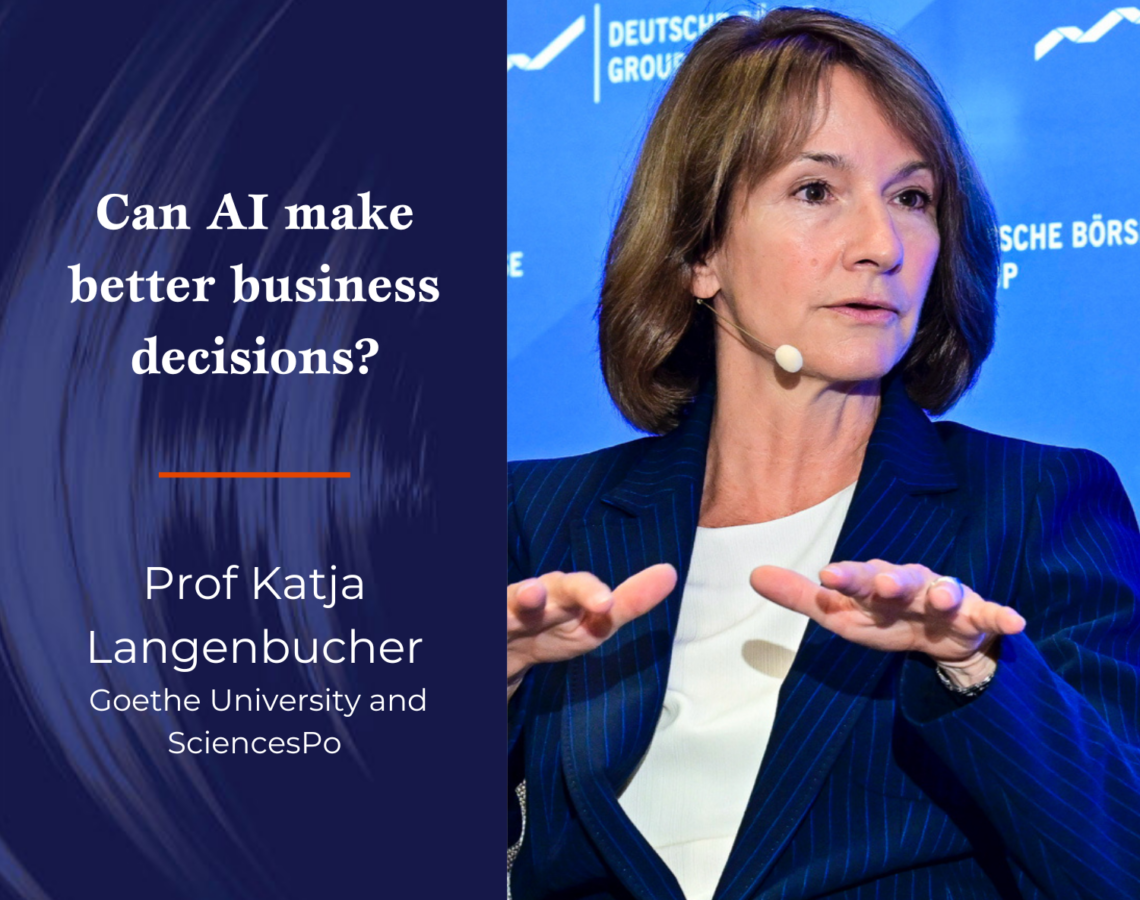Can AI make better business decisions?

Artificial intelligence (AI) is transforming how decisions are made—but are boards ready?
In this episode of the Better Boards Podcast, Professor Katja Langenbucher provides an unflinching look at why boards must confront their hesitation and integrate AI into their decision-making processes.
Drawing from legal expertise and real-world board experience, Katja explains how AI is already reshaping industries—from pharmaceuticals to financial services—and why ignoring it is no longer an option.
Dr. Sabine Dembkowski, Founder and Managing Partner of Better Boards, speaks with Katja, who is a law professor at Goethe-University in Frankfurt and an affiliated professor at SciencesPo in Paris. She also teaches annually at top US law schools including Columbia, Fordham, NYU, and Penn. Katja currently serves on the supervisory boards of BaFin (Germany) and IEP (Paris), and was previously a long-standing board member at Postbank, now a Deutsche Bank subsidiary. In 2026, she will join the NYU Law Global Faculty.
Katja reveals why market leaders are embedding AI into core strategy, what this means for legal duties under the business judgment rule, and how boards can begin to use AI not as a replacement for human wisdom, but as a necessary challenger and thought partner.
“Very soon, you cannot claim to be well-informed without consulting an AI.”
For many board members, AI still feels like unfamiliar terrain—technical, opaque, and “not for us.” But as Katja notes, that perspective is dangerously outdated. In jurisdictions where the business judgment rule applies, directors are protected from liability when they make decisions with reasonable care, good faith, and sufficient information.
Boards have long relied on human experts to inform critical decisions. Now, AI is joining that standard of care—and those who neglect it may face legal scrutiny in future litigation.
“You can use AI to identify an M&A target, spot a hostile takeover risk, or even test how markets might respond to your messaging.”
Katja illustrates the practicality of AI through tangible examples—like how Starbucks uses AI to predict optimal store locations by analysing customer behaviour, local ecosystems, and competitive presence. But this is only the beginning.
Boards, she argues, are underutilising AI. In board evaluations and agenda reviews, AI rarely appears—even though the technology has vast potential to surface unknown risks, simulate future scenarios, and enhance preparation.
“Nobody is asking directors to code—but boards must ask the right questions.”
Many board members are unsure how to start. Katja emphasises that the company secretary holds a pivotal role in operationalising AI within governance frameworks.
Understanding a company’s proprietary data and strategic goals is not a technical task—it’s a governance one. The role of AI experts is to implement solutions, but only boards can define the right questions that matter to their context.
“Seeing a mock ‘nasty article’ on the big screen challenged the entire board’s thinking.”
Boards often suffer from “groupthink” and self-reinforcing narratives. Here, AI can be an unexpected ally. Katja shares a striking example of a board using AI to draft media coverage scenarios—from favourable to hostile—in response to a sensitive issue.
AI becomes not just an analytical tool, but a provocateur—a device to test assumptions, stress-test decisions, and introduce contrarian views in real time.
“A good strategic decision is always a combination of AI and human thinking.”
One of Katja’s most important insights is that AI and human reasoning are not interchangeable—they are complementary. While AI identifies correlations, humans bring causation, context, and judgment.
The three top takeaways for effective boards from our conversation are:
- Don’t Be Late to the Party – AI is fast becoming a market standard. Boards that delay its adoption risk strategic, legal, and reputational disadvantage.
- Blend AI with Human Judgment – Strategic decisions should integrate the pattern-finding power of AI with the contextual understanding of human directors.
- Use the AI That Suits Your Board – Every corporation has a unique data pool. Boards must define the questions AI should answer—and then select tools that match their specific needs.
Remember to subscribe and never miss an episode of the Better Boards Podcast Series. It’s available on Apple, Spotify, or Google.
To find out how you can participate in the Better Boards Podcast Series or for more information on Better Boards’ solutions, please email us at info@better-boards.com.




